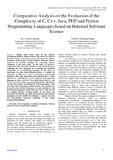Comparative Analysis on the Evaluation of the Complexity of C, C++, Java, PHP and Python Programming Languages based on Halstead Software Science
Abstract
Quality plays center stage in any software development industry. Software metrics have proven over time as the best measure to be used to assess and assure the software
developers of the quality of their products. Halstead software science is an essential technique for measuring software complexity at the source code. In this study, we present a comparative study using this technique to help the developer by evaluating the code complexity by considering the structural composition of a programming language. In this study, an experiment was done using Halstead metrics to evaluate the complexity of PHP, C++, Java, C and Python programming languages. This study demonstrate that Halstead gives a better approach in evaluating the level of complexity of programming languages at source code level. The results showed that C++ and Java are the most complex programming languages while Python was the least complex warranting less of the programmer's time and effort when developing a similar project. These findings can be used by the software developers to make decisions on the programming language to adopt when they want to come up with less complex software of high quality. In the future, the researchers will advance the study to incorporate other software paradigms and also modify the technique to capture also inter and intra-modular structural complexity of the various programming languages.
Collections
- Journal Articles (CI) [118]

